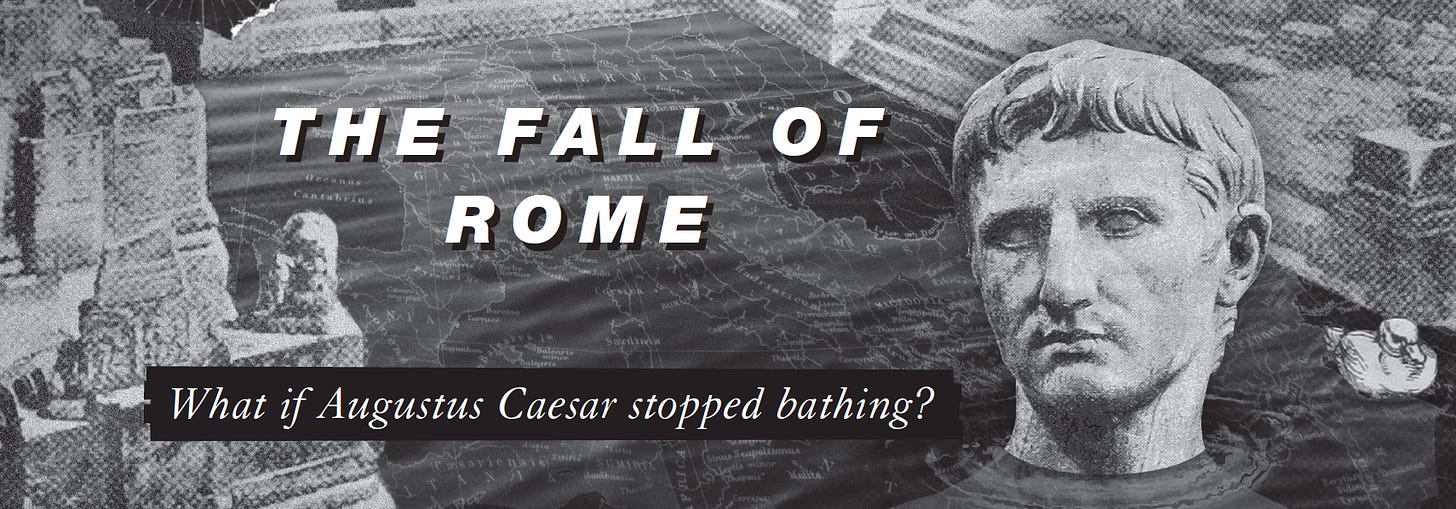These are annotations for the fifteenth chapter of the book Impossible Histories. I’m not saying you need to keep a copy of IH open next to you as you read, but it might make some things clearer?
p. 289
•epigraph
Except for graveyards and bathhouses, the whole earth is a mosque.
§Al-Tabirzi, A Niche for Lamps (C14).
p. 290
•the empire’s leadership does not have the best reputation: Here’s Emerson: “The barbarians who broke up the Roman empire did not arrive a day too soon.” [“Considerations by the Way” (1860).]
•a 1963 Superboy story:
•Tiberius, Caligula, Nero, Domitian, and Elagabalus: Wilde presents them in the order: Tiberius, Caligula, Domitian, Nero, Elagabalus, which is achronological. But: The reference to Nero is somewhat ambiguous, and it may be that Domitian is being hailed as Nero Caesar for some reason. The punctuation in the modern edition I read—a semicolon, as is used to separate the other emperors—makes Nero look like part of the sequence, but some (not all!) older editions use a colon instead, making Nero part of the Domitian section. Cf. The Picture of Dorian Gray and Other Writings (Bantam, 1983) p. 126 with The Writings of Oscar Wilde vol. IV (Gabriel Wells, 1925) p. 264.
p. 292
•so addicted to baths that it made them decadent and weak: Marcus Aurelius similarly condemned the decadence of the Syrian legions, who were “behaving with the morals of Daphne” and “bathing in hot water.” He sent a stern disciplinarian to get the bathing cut out, but like most Stoic strictures of M. Aurelius, this one didn’t stick. Now, this information comes from the Historia Augusta, a mostly spurious Roman history, so it may be false—but the point is that the author of the Historia Augusta, himself a Roman, believed it! [Anthony Birley, ed., Lives of the Later Caesars (Penguin, 1976) p. 153.]
•Hot baths have been shown to reduce sperm counts: Other theories for declining Roman population have been floated: Perhaps the Romans were becoming increasingly sterile from eating food cooked in lead pots. Perhaps Romans evolved to have few children because men competed to marry women with no siblings (ensuring they’d get the full inheritance). And then there is the claim that an increasing acceptance, or even faddishness, of homosexuality in the Empire led to a lower birthrate, especially among the upper classes.
I don’t find any of these theories as plausible as the bath theory. The claim that Rome was ever very open or tolerant of homosexuality (for example) is clearly overblown. It might be true if we compare Rome to, say, Victorian England, but it is certainly not true if we compare Rome to ancient Greece, or to a modern ideal. Strangely enough, one reason people assume homosexuality was so accepted and widespread in the Empire is that some ancient writers, such as Suetonius, wrote books claiming that many emperors were gay; however, Suetonius meant this claim primarily as an insult, and Suetonius’ insults need to be taken with a grain of salt. It’s unlikely that empresses became prostitutes as often as Suetonius claims they did; it’s also unlikely that emperors were gay as often as Suetonius claims they were. The whole reason Suetonius brought the emperors’ sexualities up in the first place is that he knew his readers would be scandalized (Suetonius was always looking to scandalize). Assuming that everyone Suetonius called gay was really gay is like assuming everyone a junior high school bully calls gay is really gay. In a society where homosexuality is really accepted, the term stops being an insult.
That being said, Hadrian was pretty gay; and Hadrian had no children. Ditto for Elagabolus (he may never have consummated his shocking marriage to the Vestal Virgin, referenced below). But this was unlikely to have been the norm among emperors.
•laws of this nature: Conversely, peoples on small islands, such as the Polynesians, tend to work it the other way, developing cultural institutions that encourage people not to breed, lest they overpopulate their home territory.
p. 294
How could that have happened?: There are, of course, a million other theories. I quote Gibbon’s “immoderate greatness” on IH p. 332. Here’s one I got from F.W. Walbank (author of The Awful Revolution: The Decline of the Roman Empire in the West):
So: Rome had an economy built on slaves, and eventually there weren’t enough slaves to go around. In the ancient world, slaves ended up on the slave market from two main sources: either they were kidnapped by pirates or they were taken captive in war. Well, Rome spent a lot of effort getting rid of pirates (remember, the entire Mediterranean was “a Roman lake” because they owned all of its shores) and the empire was so big that wars only took place far, far away from the city of Rome. For new slaves to get to Rome was quite a march! Add to this the growing humanitarian trend—spurred first by followers of the philosophy of Stoicism and later by Christians—of freeing one’s slaves, especially on their master’s death. The result was that Rome was short on slaves, and there was no one to throw pots or cut stones. There was no one to do work!
Meanwhile, the outer provinces—less civilized, less humane, and more often at war—still had access to slave labor. They also had access to semi-civilized serfs who were not too proud to do a slave’s labor for a pittance. So manufacture gradually moved further and further from Italy and the heart of the Empire. Eventually, Romans in Gaul and Britain, in North Africa and the Near East, realized they were generating most of the industry, and were in some sense more important to the Empire than the seat of government. This was a sure-fire way to destabilize the Empire.
I think Walbank has a clever idea, here; I’m sure it didn’t help things. You can find a dozen competing theories of decline, and they’re all probably true as far as they go, and none of them are enough to topple Rome on their own, or perhaps even in aggregate (except my theory, of course!).
p. 297
•Marcus Aurelius only made two big mistakes in his life: Robin Campbell once called Stoic philosopher Seneca “history’s most notable example of a man who failed to live up to his principles”; but surely the enormity of M. Aurelius’s mistakes get him an honorable mention?
I don’t mean to be too hard on these guys. Maybe it’s really hard being a Stoic! Maybe we should prefer people who reach for something impossible and fail than low-hanging-fruit pickers who succeed at their hedonistic nihilism (or whatever).
Saki wrote: “It is the golden rule of all religions that no one should really live up to their precepts; when a man observes the principles of his religion too exactly he is in immediate danger of founding a new sect.”
[Seneca, Letters from a Stoic (Penguin, 1985) p. 14; The Novels and Plays of Saki (Viking, 1944) p. 249.]
•He also tried to rename…the months of the year: August was to be Commodus, while other months were renamed after Commodus’s nicknames, attributes, and obsessions: September → Hercules [C’s patron and ideal]; October → Invictus [i.e. undefeated]; November →Exsuperatorius [i.e. conquering]; December → Amazonius [“his own surname” because of his obsession with Amazons. [Birley p. 171 (c.g.s.!).]
p. 302
•for its wonderful location: The nearby city of Chalcedon was called the “city of the blind” because its founders would have had to have been blind to build a city somewhere other than this perfect peninsula.
p. 303
•end of the humanity: Well, sure, that’s a typo for “end of humanity,” but more importantly: I’d remembered reading somewhere that Augustine had called the fall of Rome the end of the world; I went looking through the source of the quote in a Penguin edition of The City of God, and found this St. Jerome reference right in the introduction, so I decided to use it rather than flip through the following thousand pages looking for a needle in a haystack.
If anyone has the Augustine quote, though, please let me know!
p. 304
•epigraph:
There were his young barbarians all at play,
There was their Dacian mother—he, their sire,
Butcher’d to make a Roman holiday—
All this rush’d with blood.—Shall he expire
And unavenged?—Arise, ye Goths and glut your ire!
§Byron, Childe Harold’s Pilgrimage.
•Augustus never figured out a way to make Roman reproduce: Other peoples have had quite the opposite inheritance problem: Often there are too many heirs, and each one wants to control the kingdom. The Ottomans, the empire that conquered the Byzantines, ending the millennium-and-a-half history of the Roman Empire, developed a technique for dealing with the problem of multiple potential heirs: When a new sultan took the throne, he immediately executed all his brothers, leaving no rival claimants to power. Shakespeare refers to this practice in Henry IV Part II (V.ii), when Prince Hal, about to become King Henry V, says:
Brothers, you mix your sadness with some fear.
This is the English, not the Turkish court;
Not Amurath an Amurath succeeds,
But Harry Harry.
Prince Hal means: “Don’t worry, my brothers. I’m not going to kill you.”
The Ottoman fratricide plan worked great—once or twice. Murad I (also known as Amurath, above) had his half-brother Ibrahim done in, and his son Bayezid I strangled his brother with a bowstring—to avoid spilling his royal blood—but by the third generation, Bayezid's sons knew the trick and refused to trust each other long enough to be murdered. Instead they fought each other in eleven years’ worth of war to decide the next sultan. Although from time to time a new sultan would get away with murdering his brothers—Mehmed II, who passed a law requiring political fratricide, drowned his half-brother, who was an infant and couldn't do anything about it—most Ottoman sultans saw their brothers flee immediately upon accession, heading for the hinterlands to try to drum up enough support for a revolt. After all, if Shakespeare knew about the custom, Ottoman princes would certainly have caught wind of it. They had to wonder where their uncles were.
(Later on, by the seventeenth century, the more modern and humane Ottoman sultan was sequestering all potential heirs, forbidding them any education or exposure to the outside world, so they could never build a power base for revolt. This had the unfortunate consequence of ensuring that the eventual legitimate heir to the empire was completely ignorant of the outside world when he assumed power. Cue the Ottoman decline.)
•The Romans could have adjusted their culture: Another possible adjustment: polygamy (like the Ottomans!). Roman custom forbade it, and although Roman Emperors frequently divorced, and broke other Roman marriage taboos—Elagabalus married a Vestal Virgin, one of the priestesses who tended the sacred fire of Rome, a serious breach of religious protocol that helped lead to his assassination a year later—none of them went so far as to be married to more than one wife at once.




